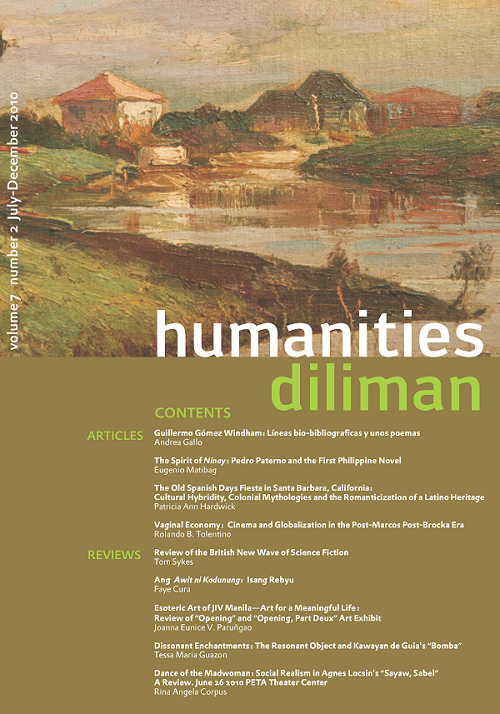THE SPIRIT OF NINAY: Pedro Paterno and the First Philippine Novel
Abstract
This study of Pedro Paterno’s Nínay (1885) examines the first novel to be published by a Filipino author, setting the work against the background of the author’s activities in Madrid and his work as a writer, host and diplomat. Considering the novel’s status to be that of a fictional-historical archive and literary ethnography, this essay elaborates its foundational discourse on the developing national culture, conceived as intrinsically hybrid, fundamentally an amalgam of Spanish and Asiatic elements. As foregrounded in this reading, the novel makes reference to particular and idiosyncratic aspects of Philippine tradition, explicating its relationship to the Spanish colonial bond that constituted the Philippines as a national territory and overseas possession. Availing itself of the devices of costumbrismo, the narrative of Nínay is staged as an extended act of mourning: that is, its internal structure follows the protocol of the pasiám, the nine-day prayer for the welfare of the soul of the departed loved one. It is this structure that frames the treatment of Nínay’s significance as a ghostly figure that haunts the text, one around whose phantasmatic presence a community of mourners is created and a new kind of discourse is generated: what could be called a spectral allegory of la filipinidad. Against the critical orthodoxy that judges Nínay to be a flawed and superficial work, the present study maps the narrative’s recodification of available elements of an emergent national culture in a narrative as an affair of Tagalog- and Castillian-speaking Filipino characters. Indeed, Paterno, by his authorship of Nínay, subsequent works of ethnography and the libretto for The Dreamed Alliance, the opera that debuted in 1902, offers us the portrait of the author not only as an initiator of discourse in search of a unique Filipino national identity, but also as a medium of his own country’s “spectral nationalism” as an overseas possession of changing empires.
Published
2010-12-21
How to Cite
MATIBAG, Eugenio.
THE SPIRIT OF NINAY: Pedro Paterno and the First Philippine Novel.
Humanities Diliman: A Philippine Journal of Humanities, [S.l.], v. 7, n. 2, dec. 2010.
ISSN 2012-0788.
Available at: <https://journals.upd.edu.ph/index.php/humanitiesdiliman/article/view/1986>. Date accessed: 04 sep. 2025.
Issue
Section
Articles
Keywords
Paterno, novel, archive, pasiam, identity, ethnography


